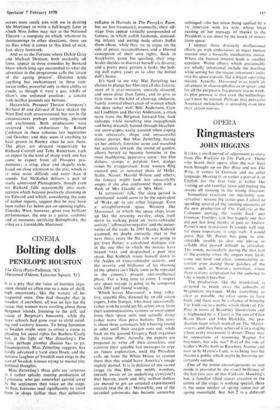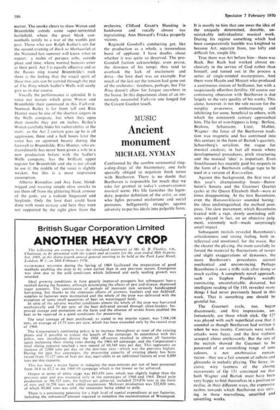OPERA
Ringmasters
JOHN HIGGINS
It takes a small period of adjustment to move from Die Walkiire to The Valkyrie. Those who learnt their opera after the war have been brought up on Der Ring and not The Ring, it comes in German and no other language. Hearing it, or rather a part of it, in English for the first time is rather like visiting an old familiar town and finding the streets all running in the wrong direction.
Immediate reactions are inevitably con- servative: restore the status quo. I admit to spending several of the opening moments of the new production of The Valkyrie at the Coliseum putting the words back into German. Fruitless task but happily one that did not last long thanks in part to Andrew Porter's new translation. It sounds well and. far more important, it sings well : 1 would guess that Mr Porter has gone to con- siderable trouble to alter any phrase or syllable that proved difficult to articulate. The words, particularly during the first half of the evening when the singers were fresh. came out loud and clear, commanding at- tention even during those patches of the opera, such as Wotan's narration, where there is every temptation for the audience to take a mental breather.
The production, like the translation, is designed to brush away the cobwebs of Wagnerian mystique. Make everything as clear as possible, the edict seems to have been, and there may be a chance of bringing The Valkyrie to a public which thinks of The Ring in terms of Beardsley illustrations and is frightened by it. Clarity is the aim of Glen Bvam Shaw and John Blatchley, the pro- duction team which worked on The Master- singers, and they have achieved it in a staging where every movement is direct. There may be accusations of mounting Wagner for beginners, but why not? Part of the role of Sadler's Wells. both in Rosebery Avenue and now in St Martin's Lane. is to bring into the theatre a public which might be hovering un- certainly outside.
One of the prime encouragements to step inside is provided by the visual brilliance of the last two acts of this Valkyrie. Hunding's hut, a familiar tilted saucer creation in the centre of the stage, is nothing special; there is the sense neither of spring storm nor of spring moonlight. But Act 2 is a different. matter. The smoke clears to show Wotan and Brunnhilde astride some super-terrestrial battlefield, where the great black can- nonballs testify to a war of the worlds just past. Those who saw Ralph Koltai's sets for the second evening of Back to Methuselah at the National last summer will know what to expect: a realm of perspex orbs, outside place and time, where normal humans enter at their peril. Act 3 is equally effective and as the flames ring round Brunnhilde's rock there is the feeling that the visual spirit of these two acts can be carried through the rest of The Ring which Sadler's Wells will surely give us in due course.
Vocally the performance is splendid. It is voice not stature which gives Wotan and Brunnhilde their command in this Valkyrie. Norman Bailey is far from tall and Rita Hunter must be one of the shortest singers in the Wells company, but when they open their mouths they put on inches. Bailey's Wotan carefully hides his vulnerability at the start : as the Act 2 curtain goes up he is all aggression, three and a half hours later the voice has an agonised beauty during the farewell to Brunnhilde. Rita Hunter, who ex- traordinarily has never been given a role in a new production before with the Sadler's Wells company, has the brilliant upper register for Brunnhilde and she is not afraid to use it; the middle of the voice is slightly weaker, but this is a most impressive assumption.
Alberto Remedios and Ave June, blond- wigged and wearing simple olive smocks to cut them off from the glittering black armour of the gods, are a radiant Siegmund and Sieglinde. Only the love duet could have done with more ecstasy and here they were not supported by the right glow from the orchestra. Clifford Grant's Hunding is handsome and vocally almost too ingratiating; Ann Howard's Fricka properly vicious.
Reginald Goodall's conducting got, like the production as a whole, a tremendous burst of applause. I have doubts about whether it was quite so deserved. The pro- Goodall faction acknowledge, even praise, the slowness of his tempi; they tend to overlook the lack of excitement and drive—the love duet was an example. For much of the last act the tension had gone out of the orchestra : tiredness, perhaps, but The Ring doesn't allow for fatigue anywhere in the house. In this department alone of an im- mensely successful Valkyrie one longed for the Covent Garden touch.



































 Previous page
Previous page